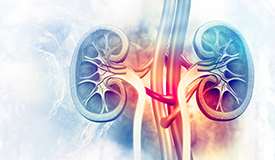Office of Research & Development |
 |
Office of Research & Development |
 |
March 1, 2022

Photo: ©Getty Images/Mohammed Haneefa Nizamudeen
Nephropathy, or kidney disease, is the deterioration of kidney function. The final stage of nephropathy is called kidney failure, or end-stage renal disease (ESRD), a disease that is fatal unless treated properly. Diabetes (a chronic disease characterized by high levels of sugar in the blood) is the most common cause of ESRD.
In 2013, VA researchers from throughout the nation published the results of a study they called NEPHRON-D. The study indicated that taking two forms of blood pressure medication at the same time was harmful. Its results have guided clinicians throughout the world in determining proper courses of treatment for diabetic nephropathy in their patients.
High blood pressure, or hypertension, is a complication of diabetes believed to contribute most directly to diabetic nephropathy. Hypertension is both a cause of kidney disease and a result of the damage caused by the disease.
One of the most common therapies for diabetic nephropathy is angiotensin-converting-enzyme (ACE) inhibitors, medications that help relax the veins and arteries to lower blood pressure. Another therapy uses angiotensin-receptor blockers, which reduce the tightening of blood vessels. The NEPHRON-D study, which looked at just under 1,500 Veterans with type 2 diabetes (the type usually diagnosed in adults), found that while each therapy by itself could reduce the blood pressure of people with diabetes, taking both medications together created a serious risk of life-threatening complications.
All of the patients in the study received losartan, an angiotensin-receptor blocker. In addition, half received lisinopril, an ACE inhibitor; the other half were given a placebo. The researchers found that the combination of losartan and lisinopril decreased proteinuria, which is the presence of abnormal quantities of protein in the urine that may indicate kidney damage.
This was a positive outcome, but patients receiving both medications also had significantly more instances of acute kidney injury, which occurs when kidneys suddenly become unable to filter waste products from the blood. Many in this group also developed hyperkalemia, a higher than normal level of potassium in the bloodstream that can cause serious heart problems.
Because of these issues, the investigators terminated the study early and concluded that taking ACE inhibitors and angiotensin-receptor blockers together was associated with an increased risk of adverse events among patients with diabetic nephropathy. The significant increase in risk caused by taking the combination of drugs overshadowed any benefits taking the drugs may have in reducing the progression of kidney disease.
The therapy was neither effective nor safe, and the study, along with similar results from two other non-VA studies, has kept clinicians throughout the world from using the two types of medication together.
Principal investigator: Dr. Linda F. Fried, VA Pittsburgh Healthcare System
Selected publications:
Combined angiotensin inhibition for the treatment of diabetic nephropathy. Fried LF, Emanuele N, Zhang JH, Brophy M, Conner TA, Duckworth W, Leehey DJ et al. N Engl J Med. 2013 Nov 14;369(20):1892-903.
Diabetic Nephropathy (Kidney Disease), Johns Hopkins Medicine web site.
The VA NEPHRON-D study in diabetic nephropathy: the experiment was a success, but the patient got sicker. Primary Care Diabetes Society, 12 May 2014